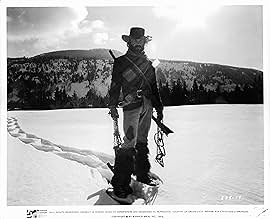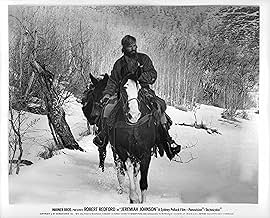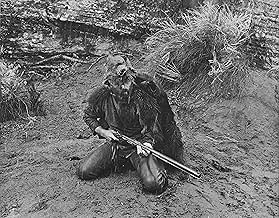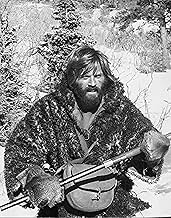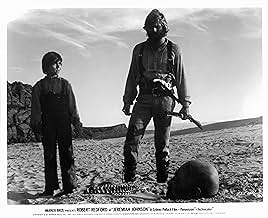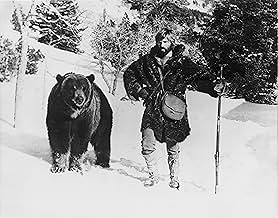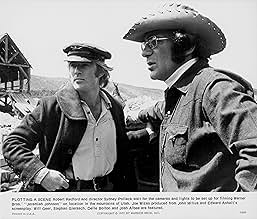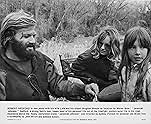Jeremiah Johnson
- 1972
- Tous publics
- 1h 48min
Un montagnard qui souhaite mener une vie d'ermite devient malgré lui l'objet d'une longue vendetta de la part des Indiens.Un montagnard qui souhaite mener une vie d'ermite devient malgré lui l'objet d'une longue vendetta de la part des Indiens.Un montagnard qui souhaite mener une vie d'ermite devient malgré lui l'objet d'une longue vendetta de la part des Indiens.
- Réalisation
- Scénario
- Casting principal
- Récompenses
- 1 victoire et 1 nomination au total
- Paints His Shirt Red
- (as Joaquin Martinez)
- Indian
- (non crédité)
- Qualen's Daughter
- (non crédité)
Avis à la une
Solid western with interesting events , violent fights , emotions , thrills and spectacular outdoors . From the initiation until the final are proceeded continuous battles against nature and a survival fighting versus wintry wilderness , enemy trappers and savage Indians, among others . The story is a crossover of various films, the battle against nature of ¨Man of a wilderness land¨ and Indians as ¨ Man called horse ¨ and the obstinacy and stubbornness of relentless enemies who fight with no rest such as ¨The duelists¨. The magnificent cast is starred by an excellent Robert Redford , a simple man who has no taste for cities and becomes a tough and two fisted mountain man obsessed a bloody revenge . Supporting cast is featured by various actors in brief performances as Jack Colvin , Matt Clark , Charles Tyner and special mention to Will Geer as feisty old trapper . Splendid cinematography in Panavision and glimmer Technicolor by Duke Callagham as is reflected on spectacular outdoors filmed in sighting, rousing natural parks from Rocky Mountains. Lively and evocative musical score by usual secondary actor John Rubinstein and beautiful songs by also actor Tim McIntire . The motion picture is stunningly directed by the recently deceased Sidney Pollack (Yazuka, Three days of the condor, Way we were, Out of Africa). Rating : Better than average . This outstanding film will appeal to Robert Redford fans and landscape lovers .
Its curious screenplay is the result of two vastly different writing styles (as were the original books) Semi-classicalist, Edward Anhalt (known for Becket '63) and young-gun of the time John Milius (collaborative writer on Apocalypse Now '79) J. J. is visually stunning all the way with striking Alberta location cinematography by Duke Callaghan. The accompanying music score is a result of the unique collaboration of Tim McIntire (also vocals) and actor/composer John Rubinstein (son of Arthur) capturing the drama, warmth, and humanity.
This is superior movie making that almost creates its own genre. It's different in a good way so, if you don't warm to this curious story the first time round, go back for another visit - the Christian Indian Tribe is another curious aside. WB has treated this to an excellent quality DVD release.
Hardened after the war with Mexico, and fed up with everyday life, American Jeremiah Johnson (Redford) leaves civilisation behind to live life as a mountain man. He intends to be self-sufficient as a trapper, but he finds that mother nature can be tough, and out here in the mountain wilderness he is not alone. There are others here, and Jeremiah must face many challenges if he is to truly survive.
Filmed entirely on location in the vast wilderness beauty of Utah, Jeremiah Johnson is light on plot but all the better for it. Film basically constitutes Redford's mountain man learning to survive up in them thar mountains, and, earning the right to do so. A number of issues will arise to test his metal, giving him a number of hardships and adventures to define his transformation from average Joe to a fully fledged mythical man of the Earth. Redford is wonderfully at ease in the title role, and very quickly he gets the audience on side to share in his journey. But ultimately it's the landscapes that you take away from this movie. Not only gorgeous, but also the critical character that frames Johnson during his isolation and battle for survival. 8/10
afternoon" movies. The scenery is wonderful, Redford does one of his
best performances, the characters are colorful, and it is a wonderful
story of the pioneer spirit. Then, a few years ago, a good friend told me he had the book about the
real "Liver Eatin' Johnson", about whom this movie was made. He lent
me the book to read - and I highly recommend it for anyone interested
in a first- and second-hand story of the old west. The real story of Johnson is greatly removed from the movie, though
there are many parts in common as well. Most notably absent is the
fact that Johnson would remove and partially eat the liver (raw) of the
Crow braves he would kill. This was done by Johnson to scare the Crow,
who believed their soul would wander the earth forever if the body was
not buried intact. Johnson was also known to have eaten meat from the
leg of a Blackfoot indian, whose tribe had captured him to sell to the
Crow. This incident, however, appears to have been more for survival,
as Johnson had to travel for several days through snow on foot after
escaping the Blackfoot. Johnson was a well traveled man, friend to more than the movie
suggests, and finally died of old age in Los Angeles in 1899. His
actual age is subject to dispute, but he was at least 75 yeard old.
During his long life, he met up with many recognizable characters from
the old west. I leave the names for you to discover in your reading -
it is well worth the time!
Le saviez-vous
- AnecdotesBased upon a real-life trapper named John Johnston, nicknamed "Crow Killer" and "Liver Eater Johnston" for his penchant for cutting out and eating the livers of Crow Indians he had killed (several Crows had murdered his wife and he swore vengeance against the entire tribe).
- GaffesAfter burying her murdered family, Crazy Woman begins singing "Shall We Gather at the River" and Jeremiah joins in. This song was written by Robert Lowry in 1864 and first published in 1865, long after the time of the mountain men.
- Citations
Del Gue: I ain't never seen 'em, but my common sense tells me the Andes is foothills, and the Alps is for children to climb! Keep good care of your hair! These here is God's finest scupturings! And there ain't no laws for the brave ones! And there ain't no asylums for the crazy ones! And there ain't no churches, except for this right here! And there ain't no priests excepting the birds. By God, I are a mountain man, and I'll live 'til an arrow or a bullet finds me. And then I'll leave my bones on this great map of the magnificent...
- Versions alternativesThe Warner Bros. Pictures logo is plastered with the Saul Bass variant in the 1982 VHS, 1992 variant in the DVD and 1998 VHS. The former print also has the closing Saul Bass variant plastering the line art WB shield.
- ConnexionsEdited into La Classe américaine : Le Grand Détournement (1993)
Meilleurs choix
Détails
Box-office
- Budget
- 3 100 000 $US (estimé)
- Durée1 heure 48 minutes
- Couleur
- Rapport de forme
- 2.35 : 1
Contribuer à cette page




